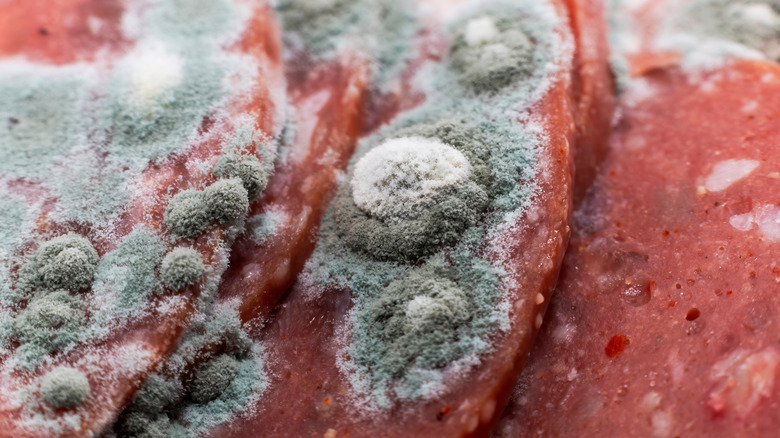Can You Really Get High From Eating Rotten Meat?
If you thought Shaliene Woodley consuming clay was on the odd side, you will love this 2021 trend. In April, IFLScience reported on the trend of "high meat" that blurs the line between traditional fermented meat and slabs of flesh left to rot. That isn't hyperbole. Rather, it is purposefully cultivating bacteria on meat until the flesh is covered. It's called high meat because many experience euphoria after eating it.
Naras Lapsys, a Singapore-based consultant dietitian, explained to Vice that the high feelings could be the result of the bacteria growing on the meat. "If you're leaving this out for anything from days to months to years, who knows what kinds of [bacteria] are going to grow, and some of those bacterias might have chemical properties that are going to give you a high, or hallucination, or a feeling of euphoria," he said.
However, those feelings are apparently only one reason to forgo the cooking process. Frank Tufano, a YouTube advocate for meat fermentation, told Medizzy that indigenous people regularly eat fermented meat. Hakarl, for example, is a fermented shark that Gastro Obscura highlights. Another example are sausages like chorizo, salami, and pepperoni. So, why, Tufano asks, should we be so squeamish about fermented meats when people regularly eat them and other fermented foods like cheese?
You shouldn't eat homegrown high meat
The issue with fermented meat is that the line between genuinely fermented meat and spoiled meat is rather thin. Delighted Cooking explains that the process must not allow air to enter, lest bacteria grow on the meat. Even in cases where people generally know how to ferment meat, this can go horribly wrong.
In coverage of the trend, CNET noted that about 350 cases of the potentially fatal disease botulism occurred in Alaska between 1950 and 2017. The outbreaks were due to the consumption of fermented foods, which are traditional among the state's indigenous people. Over the course of 67 years, that number may seem low, but it emphasizes the fact that even in a more expert environment, the preparation of the food can go wrong. Another aspect was brought to light by Leah Groppo, a clinical dietician at Stanford Health. "The meat people caught was different from the meat that's being bought at a grocery store," Groppo noted. For one thing, the meat was fresher. In a second point, the meat would be alive only moments prior, meaning that for the sake of conserving energy, people would have to ferment the food to extend resources.
On a more humorous note, a New Yorker piece from 2010 includes the fact that people who regularly eat high meat occasionally grow ill and are left "explosively incontinent." In short, just buy a sausage. Your bowels will thank you.

